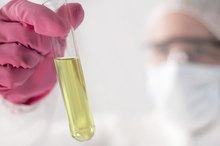Are Sweet Potatoes Harmful to the Kidneys?
Sweet potatoes are powerhouses of nutrition packed into one medium serving. As an alternative to white potatoes, the baked sweet potato is flavorful on its own, without additional dressing or fluff such as butter and sour cream. For healthy adults, eating a sweet potato daily or a few times a week offers a nutritional boost. However, if you have kidney disease, sweet potatoes, along with other seemingly nutritious foods, could cause harm.
Kidney Function
The kidneys act as a filtration system for removing excess fluids and waste products from your body, which is acquired during metabolism of food substances you ingest. Your kidneys also remove drugs from the body; maintain fluid and electrolyte balance and play a role in releasing hormones that regulate blood pressure. Healthy kidneys perform these critical biochemical functions constantly and without mishap. Diseased kidneys however, are not able to efficiently filter harmful substances from your body and perform these jobs at a slower rate. This results in nutrient accumulation rather than filtration, which can have toxic ramifications. Harm from excess vitamins and minerals in your bloodstream accelerate kidney damage and lead to other organ damage, body swelling and high blood pressure.
Sweet Potato Nutrients
Are Olives Good for the Kidneys?
Learn More
Sweet potatoes are rich in vitamins and minerals. Normally, a hardy food like the sweet potato is a nutritious, low-fat and fibrous choice for a healthy diet. This is particularly true because of the significant amount of vitamins A and C; and minerals such as potassium and calcium they contain. In the presence of kidney disease, your dietary needs change and what appears as a nutritious food for healthy kidneys, becomes one that you must limit in the diet for kidney disease. Most significant is reducing your intake of potassium and vitamin A, the two prominent nutrients in sweet potatoes.
Potassium, Vitamin A and Kidney Disease
Diseased kidneys cannot remove excess potassium quick enough from your body and the excess potassium can cause dangerous effects including weakness, arrhythmia or heart attack. When you have kidney disease, potassium levels must remain in a safe range, which is generally tested monthly by your physician. It is a delicate balance to get enough potassium in your diet without raising blood levels too high. Vitamin A, normally important for protecting the immune system and cell health, must also be limited in the diet for kidney disease. Toxic levels of vitamin A , leading to edema or liver damage, can also occur from poor kidney filtration. Your physician or a renal dietitian can teach you how to maintain safe levels through dietary changes.
Considerations
Normal Urinary Output for an Adult
Learn More
The average medium sweet potato has 265 milligrams of potassium and 26,000 international units of vitamin A. The daily recommended intake of potassium for healthy adults is 4,700 milligrams, and vitamin A is recommended at 3,000 IU per day.
Related Articles
References
Writer Bio
Aubri John has been a contributing researcher and writer to online physical and mental health oriented journals since 2005. John publishes online health and fitness articles that coincide with her licensed clinical skills in addictions, psychology and medical care. She has a master's degree in clinical social work and a Ph.D. in health psychology.









